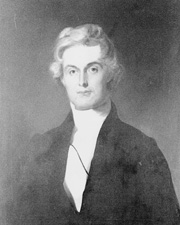William Harper
William Joseph Harper (born January 17, 1790 on the island of Antigua , Antigua and Barbuda , † October 10, 1847 in the Fairfield District , South Carolina ) was an American politician . In 1826 he represented the state of South Carolina in the US Senate .
Career
While he was still a child, William Harper came to South Carolina with his parents, where the family settled in Columbia . He attended public schools, Mount Bethel Academy, and Jefferson Monticello Seminary . In 1808 he graduated from South Carolina College , later the University of South Carolina . He first studied medicine. Later he went on to study law. After his admission to the bar in 1813, he began to work in Columbia in his new profession. At the same time he began a political career as a member of the Democratic Republican Party . In 1816 and 1817 he sat in theState House of Representatives . In 1818 he temporarily moved to Missouri , where he held the administrative office of the Chancellor of the State of Missouri between 1819 and 1823 . In 1821 he was a member of a constitutional convention there.
In 1823 Harper returned to Columbia, South Carolina. From 1823 to 1825 he was employed as a reporter at the State Supreme Court . Politically he was then a supporter of Andrew Jackson (Jacksonian). After the death of US Senator John Gaillard , William was appointed as his successor in the US Senate. He held this office between March 8 and November 29, 1826. Then the elected William Smith took over this mandate. In the following years, Harper practiced as a lawyer in Charleston . In 1827 and 1828 he sat again in the State House of Representatives of South Carolina, of which he was also president. From 1828 to 1830 he held the administrative office of the Chancellor of the State of South Carolina . He moved back to Columbia and was an appeals judge from 1830 to 1835. In 1832 he was a member of a meeting of his state at which the nullification doctrine was discussed. By then, Harper had long since moved away from Andrew Jackson. He supported John C. Calhoun and his policies, which resulted in an open confrontation with the federal government under President Jackson. He also advocated strengthening state rights vis-à-vis the federal government, and he was an advocate of slavery . From 1835 until his death on October 10, 1847, Harper was again Chancellor of his state.
Web links
- William Harper in the Biographical Directory of the United States Congress (English)
| personal data | |
|---|---|
| SURNAME | Harper, William |
| ALTERNATIVE NAMES | Harper, William Joseph (full name) |
| BRIEF DESCRIPTION | American politician |
| DATE OF BIRTH | January 17, 1790 |
| PLACE OF BIRTH | Antigua , Antigua and Barbuda |
| DATE OF DEATH | October 10, 1847 |
| Place of death | Fairfield District, South Carolina |

